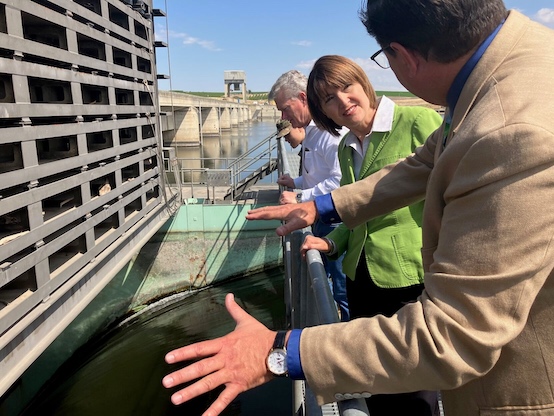forum
library
tutorial
contact

Lawmakers Question Snake River
Dam Mediation Secrecy
by Matthew Weaver
Capital Press, June 27, 2023
|
the film forum library tutorial contact |

|
Lawmakers Question Snake River
by Matthew Weaver
|
Operational changes would be at the discretion of the agency
and NOT require congressional approval. - Beth Coffey, USACE
 RICHLAND, Wash. -- Republican lawmakers, during a field hearing here June 26, hammered at the secrecy of federal surrounding mediation designed to reach a solution in long-running litigation over the four lower Snake River dams.
RICHLAND, Wash. -- Republican lawmakers, during a field hearing here June 26, hammered at the secrecy of federal surrounding mediation designed to reach a solution in long-running litigation over the four lower Snake River dams.
In 2020, a coalition of environmental and fishing groups, led by the Earthjustice law firm, sued over the U.S. Army Corps of Engineers, Bureau of Reclamation and Bonneville Power Administration's latest dam operations plan.
The plan called for spilling more water over dams, rehabbing wetland and riparian areas and modifying some fish passage facilities, but stopped short of breaching dams, which environmental groups consider a top priority.
Agricultural stakeholders support salmon recovery, but say dam removal is not a silver bullet to automatically restore fish populations. They cite the economic and environmental impacts that would result from breaching.
The White House Council on Environmental Quality (CEQ) and Federal Mediation and Conciliation Service are running federal mediation during a stay of the litigation. The stay will end Aug. 31.
Oregon Rep. Cliff Bentz, chairman of the House of Representatives Committee of Natural Resources' Subcommittee on Water, Wildlife and Fisheries, asked representatives of the companies participating in the federal mediation process who had authorized the mediation's confidentiality.
"Unfortunately, when you see that kind of approach, the only people who then get to say what the outcome of the lawsuit is going to be are those who are involved in the lawsuit," Bentz told the Capital Press. "Many people who are going to be affected by that lawsuit are not at the table .. It's parts of a lawsuit that are basically creating policy, and that is incorrect, inappropriate and wrong."
Bentz and other lawmakers -- Rep. Cathy McMorris Rodgers, Rep. Dan Newhouse, both of Washington, and Rep. Mike Collins, of Georgia -- asked questions about the impacts breaching the dams would have to nine witnesses during the hearing. The witnesses represented agencies, electric companies, public utility districts, ports and agricultural commodities and stakeholders.
"Do you have any idea when Congress, the elected representatives of the people, will get an update about this confidential mediation that includes potential breaching of the dams?" McMorris Rodgers asked.
Participants in the mediation -- Beth Coffey, director of programs for the U.S. Army Corps of Engineers Northwestern Division; Jennifer Quan, West Coast regional administrator, National Oceanic and Atmospheric Administration (NOAA) National Marine Fisheries Service, or NOAA Fisheries, and John Hairston, administrator and CEO of Bonneville Power Administration -- all deferred to the CEQ and conciliation service.
Bentz accused the CEQ and the agencies in the mediation of trying to dewater the pools behind the two upper dams to "neuter" the dams and reach "the functional equivalent of dam breaching," in an effort to circumvent the congressional authorization that would be needed to breach the dams.
He pointed to phrasing in a "legal" memo that he said was given to all mediation participants referring to "extreme drawdowns that substantially reduce, if not eliminate, electricity production on the Snake River dams and destroy navigation by existing barges during large, if not all, portions of the year."
Bentz declined to comment further about the memo, its author or how he obtained it.
Operational changes would be at the discretion of the agency and not require congressional approval, Coffey said in response to Bentz's questions.
Quan said she is not aware of the memo to which Bentz referred.
Such an approach would "terrifically" damage ratepayers, taxpayers, farmers and ranchers and residents on the river, Bentz said.
"I don't think there's any doubt -- we've hit upon exactly what they're doing," he said. "Now the question is, how do we appropriately say, this is not the proper way to create policy regarding the Northwest dams?"
The four legislators toured Ice Harbor Dam in Burbank, Wash., earlier in the day.
During the hearing, witnesses provided commentary about the impact the dams have, on the region, its economy and its communities.
David Welch, president and founder, Kintama Research Services, Ltd., based in Nanaimo, British Columbia said during the hearing he had been studying salmon-related issues for nearly 40 years, and that science regarding Snake River dam breaching is "far from settled."
"Put simply, I think the Snake River dams never caused the major problems that people thought they did over half a century ago," Welch said. "They didn't understand the effect of the ocean back then and they overestimated what construction of the Snake River dams was going to do."
Shippers say the dams are vital to the region's economy.
"Last fall, we needed 4.5 million gallons of liquid fertilizer on short notice -- rail wouldn't come through, our own truck fleet couldn't possibly keep up with it, nor could anyone else's," said Alex McGregor, chairman of the McGregor Co. board of directors, in Colfax, Wash. "Tugs and barges were where we turned and they came through for us."
Removing the dams would eliminate barging, agricultural stakeholders say. Alternative infrastructure to accommodate the increased truck and rail traffic that would result does not exist, they say.
"We believe communities, salmon and dams can coexist, because we are living proof that they do," said Scott Corbitt, general manager of the Port of Lewiston in Lewiston, Idaho.
learn more on topics covered in the film
see the video
read the script
learn the songs
discussion forum
